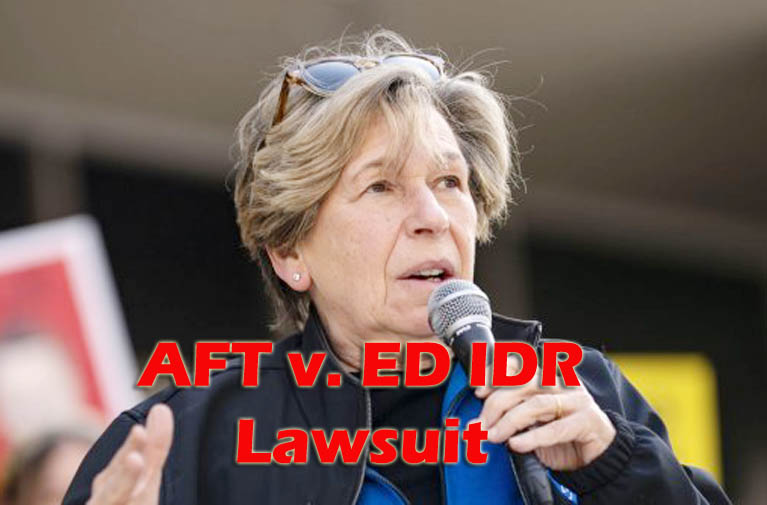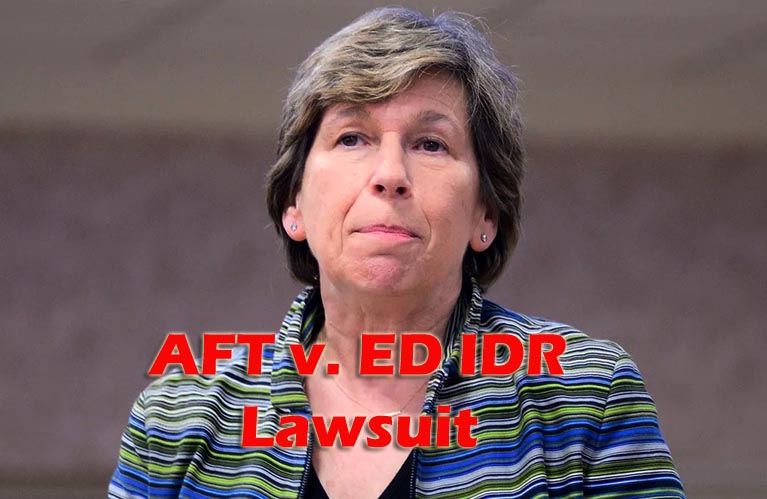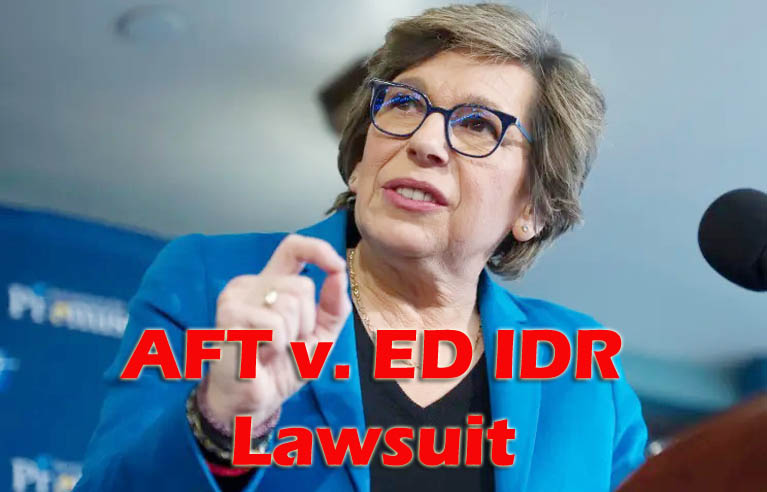If you’re feeling confused and frustrated by the recent news about the AFT v. ED IDR lawsuit, you are not alone. Millions of public service workers and borrowers on income-driven repayment plans have been watching this case closely, worried about what it means for their path to student loan forgiveness.
This guide is here to cut through the complexity. We’ll break down everything you need to know in simple terms: what this class action lawsuit is about, its current status, and most importantly, what you should do right now to protect your financial future. We’ll give you the latest news and clear, actionable steps.
What Is This Lawsuit About? A Simple Explanation
At its heart, the AFT v. Department of Education lawsuit is about a broken promise. It’s a story of how a program designed to help borrowers has instead left many feeling trapped and misled.

Who is AFT and Why Are They Suing?
The American Federation of Teachers (AFT) is one of the largest teachers’ unions in the country. They’re not just advocating for their members in classrooms; they’re fighting for them in court. They filed this lawsuit because they believe the U.S. Department of Education (ED) has grossly mismanaged a key program, causing real harm to the nurses, teachers, and government employees who rely on it.
Their argument is strong. They claim the ED’s failures have created a “mockery and injustice” for borrowers who did everything right but are still being denied the relief they earned.
The “IDR Account Adjustment” or “Waiver”: What It Was Supposed to Do
To understand the lawsuit, you have to understand the IDR Account Adjustment. This was a one-time initiative by the government to fix past mistakes. Think of it as a grand review of everyone’s loan history.
The goal was simple: count every single past payment toward loan forgiveness, even if it was made under the wrong plan or to a different servicer. For those in the Public Service Loan Forgiveness (PSLF) program, this one-time adjustment was supposed to be a miracle fix, granting immediate PSLF credit to thousands.
The Core Problem: “Betrayal of Trust” and “Gross Mismanagement”
So, what went wrong? The AFT alleges the rollout of this adjustment has been full of errors, delays, and inaccurate payment counts. Borrowers were told they would see progress, but many have seen nothing but confusion.
This betrayal of trust is the central reason behind the lawsuit. The plaintiffs aren’t just asking for a fix; they’re demanding justice for student loan borrowers who were blocked from relief.
Latest Status: Is the AFT v. ED Lawsuit Paused?
This is the most common question we hear, and the answer is yes—for now.
As of the latest developments, the lawsuit has been officially paused. In legal terms, the court issued a “stay of proceedings.” This doesn’t mean the case is over. It means both sides have hit the pause button to try and work out a solution outside of court.
Why Was the Lawsuit Paused? The ED’s Commitment
The pause happened because the Department of Education made a significant commitment. They have agreed to start publishing regular, detailed reports on their progress with the IDR adjustment and PSLF waiver.
These monthly reports are meant to create transparency. For the first time, the public and the plaintiffs will be able to see if the ED is actually meeting its targets and fixing accounts accurately.
What Happens Next? Potential Outcomes and Timeline
Everyone is now watching to see if the ED delivers on its promises. What comes next depends entirely on their progress.
-
Best Case: The ED successfully implements the adjustment, corrects all payment counts, and provides the relief owed. This could lead to a settlement and the lawsuit being dismissed.
-
Worst Case: The reports show little progress, or errors continue. The AFT would likely then ask the judge to lift the stay, and the lawsuit would move forward aggressively.
There is no firm timeline, which is the hardest part for borrowers. We are in a “wait and see” period, likely for the next several months.
Are You Part of the Class? Who This Lawsuit Affects
This isn’t an abstract news story. It impacts real people. If you fall into one of these groups, this lawsuit affects you.
Specifically: Public Service Workers (Teachers, Nurses, Government)
This class action directly impacts public service workers. If you’ve been working toward PSLF forgiveness while serving as a teacher, nurse, or government employee, this case is being fought on your behalf.
Specifically: Borrowers on IDR Plans Seeking Forgiveness
You don’t have to be in PSLF to be affected. If you are on an income-driven repayment plan and are counting on the IDR account adjustment to bring you closer to the 20- or 25-year forgiveness finish line, the outcome of this student loan lawsuit matters to you too.
How to Know if You’re Included
While the formal class action certification is still part of the legal process, the intent of the suit is to represent all borrowers who have been harmed by the mismanagement of these programs. If you believe your payment counts are wrong, you are essentially who the AFT is fighting for.
The Ripple Effect: How This Lawsuit Complicates Student Loans
The AFT v. ED lawsuit isn’t happening in a vacuum. It’s adding another layer of stress to an already chaotic time for student loan borrowers.
Problems with the New FAFSA Rollout
The same Department of Education that is struggling to manage loan forgiveness is also dealing with a notoriously rocky rollout of the new FAFSA application. This has created a sense of a system overwhelmed and underperforming, complicating things for both new students and existing borrowers.
The Return to Student Loan Payments
After a long pause, payments have resumed. Borrowers are now having to budget for these bills again, all while unsure if their progress toward forgiveness is even being counted correctly. It’s a perfect storm of financial anxiety.
A History of Servicer Errors
This lawsuit sadly fits a pattern. From PSLF denials due to servicer errors to problems with Borrower Defense claims, many borrowers have lost faith in the system’s ability to get it right. This lawsuit is a massive effort to finally hold that system accountable.

What You MUST Do Now: 5 Action Steps While Waiting
You don’t have to just sit and worry. There are powerful steps you can take right now to take control of your situation.
Step 1: Do Not Stop Your PSLF/IDR Payments or Certifications.
This is crucial. Even with the lawsuit paused, you must continue making your qualifying payments and submitting your annual PSLF certification forms. Stopping now could disqualify you from forgiveness later.
Step 2: Download Your Entire Payment History from Your Servicer.
Your servicer’s website has an option to download your full payment history. Do this immediately. This is your proof. If there are disputes later, this document is your most powerful weapon.
Step 3: Check Your Payment Counts on StudentAid.gov and MOHELA.
Log into your account on the Federal StudentAid.gov website and your servicer’s portal (like MOHELA for PSLF). See what they have listed as your qualifying payment counts. Note any discrepancies.
Step 4: Submit a Complaint to the FSA Ombudsman if Counts are Wrong.
If your numbers are wrong, don’t wait. File a formal complaint with the FSA Ombudsman Group. This creates a paper trail and officially flags the error for the Department of Education to address.
Step 5: Consider Professional Help: When to Contact a Student Loan Lawyer
If your situation is particularly complex or you have suffered significant financial harm due to these errors, it may be time to contact a student loan lawyer. They can provide specialized advice and may be able to advocate for you directly.
Frequently Asked Questions
Q: What is the current status of the AFT vs ED lawsuit?
A: The lawsuit is currently paused (under a “stay of proceedings”) while the Department of Education works on providing monthly progress reports on the IDR account adjustment.
Q: How long will the lawsuit be paused?
A: There is no definite timeline. The pause will likely last for at least a few months while the court monitors the ED’s progress. If progress stalls, the AFT can ask to resume the case.
Q: Will this delay my student loan forgiveness?
A: It might. The entire IDR account adjustment process has been slower than promised. This lawsuit is aimed at speeding it up, but the legal process itself can take time. Continuing your payments and certifications is the best way to ensure you don’t face any unnecessary delays on your end.
Q: Should I still apply for the PSLF waiver?
A: The main PSLF waiver opportunity has expired. However, the ongoing IDR account adjustment is still actively reviewing accounts for both PSLF and IDR forgiveness. You do not need to “apply” for this adjustment—it should be automatic. But you must be in a qualifying repayment plan and, for PSLF, have a certified employment form on file.
You May Also Like: Crepe Erase Lawsuit and Rowdy Oxford Lawsuit

